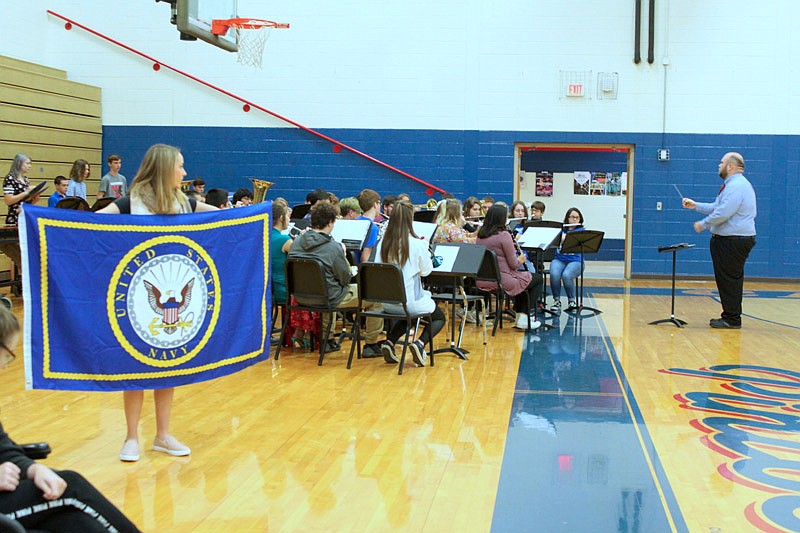George Shelley has been to Hawaii twice.
"It's beautiful there," he said. "I think."
Both of Shelley's trips to Hawaii were spent in the airport, when he and his fellow U.S. Army comrades were en route to Vietnam. Shelley told his account of the time he took an "all expenses paid, beautiful southeast Asia vacation" Nov. 8 to California High School for the school's Veterans Day program. Sitting before him in the high school gym were about 30 veterans who had their own stories to remember.
Shelley reminded the school of one thing to which many veterans can likely relate.
"Things were totally different then than they are today," Shelley said of his Vietnam days. "Back then, soldiers were treated abominably just about everywhere they went. But things have changed, thank goodness."
There has not been a moment in Shelley's life when the Army wasn't somehow involved. This simply comes with the territory, as Shelley is an Army brat. A title he said is "a mark of pride." But when Shelley came home from war, his reception was not nearly as warm as it would be today.
"We got to the airport, all ready to go home," Shelley said. "And we sat on that tarmac and waited and waited and waited and waited. We were sitting in that plane for hours. Another plane came up and was boarded and took off, but we still sat there."
When a soldier asked an airport crew member why their plane didn't follow suit, they didn't necessarily get a clear answer. The plane eventually took off and landed in San Francisco in the dead of night. Not a soul was in the airport to greet them, and the soldiers had to search the airport for help getting home. Once someone was found to hopefully offer assistance to the soldiers, they proved to be just as helpful as the flight attendants in Vietnam.
This treatment, although unspeakably disrespectful, could have been much worse, Shelley said.
"Back in 1972, when soldiers got back from Vietnam, people would throw stuff at us, cuss at us and even attack us, if they could," Shelley said. But as he said before, "things have changed, thank goodness."
A few empty seats were among the veterans sitting before the assembly, and Shelley decided to fill them with some special guests. He invited the three students, from among the 400, who have enlisted to sit with the veterans.
"Today, they're all volunteers," Shelley said. "Back then, they were almost all draftees; they had no choice. So, today we thank you for your service and the service that is to come."
Also there to honor veterans and their sacrifices were CHS Sounds of Joy singing the national anthem. The CHS Pride Band performed a medley of all the branches' songs. Another profound feature to the program was the presentation of The White Table. A simple white table was set with a student placing one item at a time, but each item holds a special meaning to remember veterans.
The table is round to show the everlasting devotion and concern for the fallen and missing comrades. The cloth is white to symbolize the purity of their motives, when answering the call to duty. The single red rose, in a vase, is a reminder of the life and blood shed and the loved ones who keep the faith and await answers. The vase is tied with a red ribbon, a symbol of commitment and continued determination to account for the missing. A slice of lemon on the plate is to remind listeners of the bitter fate of those captured and missing in a foreign land. The salt is to remind them of the tears endured by those missing and their families who still seek answers. The black napkin is a reminder of the isolation, deprivation and cruel fate of the missing. The Bible represents the strength gained through faith to sustain those lost. The glass is inverted to symbolize their inability to share their evening with loved ones. The chair is empty and tilted, to say they are not here and will remain so until they return and are accounted for.
Shelley sent off one last reminder to his audience. It is one to remember.
"When you see a homeless person sitting out in the cold, don't just assume it's just some old guy," he said. "More than likely, he has been in a combat zone; he has dodged bullets and rockets and has seen things you could never imagine.
"Give him the respect he deserves, and thank him for all he has done for us."

